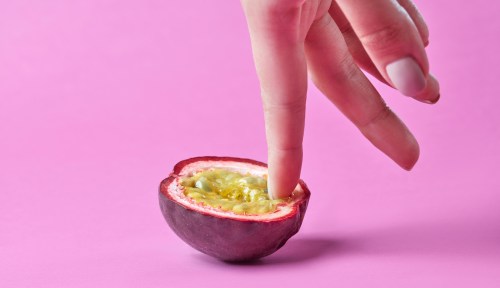Our editors independently select these products. Making a purchase through our links may earn Well+Good a commission
10 Common Causes of Pain After Sex—and What to Do About It, According to Sexual-Medicine Specialists
Pain after sex is very common. Learn from sexual-health experts why it might be happening to you and what you can do about it.

Despite the fact that sex is synonymous with pleasure, pain during sex is unfortunately all too common—particularly for folks with vulvas having penetrative p-in-v sex. While any kind of sex act can trigger different types of vulvar, vaginal, or pelvic pain in the heat of the moment, pain after sex can be just as troublesome, both physically and emotionally.
Experts in This Article
gynecologist and sexual-health specialist
pelvic-floor physical therapist and co-host of the No Mama Left Behind podcast
board-certified OB/GYN and vice chief of gynecology and director of minimally invasive gynecologic surgery at NewYork-Presbyterian Brooklyn Methodist Hospital
board-certified gynecologist and medical director at VSPOT Medi Spa
internal medicine physician and sexual-health specialist at Sameday Health
board-certified OB/GYN and author of She-ology: The Definitive Guide to Women’s Intimate Health. Period
Post-sex pain can come in many forms, from period-like cramps to vaginal swelling, itching, or a burning sensation when you pee, says gynecologist Sherry A. Ross, MD, sexual-health expert and author of She-ology: The Definitive Guide to Women’s Intimate Health. Period. And in some cases, a trigger for pain during sex or during menstruation (such asuterine fibroids or endometriosis) can lead to lingering pain after sex, too. (These issues are separate from muscle aches, like hip pain after sex, which can also happen.)
Dyspareunia, the medical term for painful intercourse, can happen before, during, and after sex. According to Michael L. Lewis, MD, board-certified OB/GYN and vice chief of gynecology and director of minimally invasive gynecologic surgery at NewYork-Presbyterian Brooklyn Methodist Hospital, the condition is “more common than we think and can affect up to 1/3 of women over their lifetime.” It’s typically diagnosed as superficial, meaning the pain is around the vulva or vagina’s entrance, or deep dyspareunia which involves pain deeper in the vagina or in the lower pelvis, he adds.
As for who is most at risk of experiencing pain after sex? Certain conditions make it more likely, such as: childbirth, not being lubricated enough, and “vaginal atrophy.” Additionally, studies have found that pelvic inflammatory disease, menopause, inflammatory disease, anxiety, sexual abuse, and depression are associated with dyspareunia.
Is it normal to experience pain after sex?
Just because many people experience post-sex pain doesn’t mean it’s normal. “It is not normal to have persistent pain after sex,”says double-board-certified gynecologist Monica Grover, DO, medical director at VSPOT medi spa. A temporary pain that resolves quickly, or transient pain, might happen if you haven’t had sex in some time or if you’re not fully lubricated; another reason for “temporary but normal pain,” she says, is “uterine contractions upon having an orgasm during sex, [but] this should resolve once the body returns to a baseline prior to intercourse.”
“[Pain after sex] has a direct impact on social and sexual relationships and can lead to other psychological problems.”—Michael L. Lewis, MD, board-certified OB/GYN
While Dr. Lewis says pain after sex generally isn’t life-threatening, it can interfere with someone’s quality of life by directly impacting their relationships and their own enjoyment of intimacy. Sex is important in romantic relationships, and if one partner is in pain before, during, or after sex it can greatly affect a couple’s sex life and intimacy; it can also affect arousal and sexual desire, and contribute to negative body image and self-esteem, hypervigilence to pain, and even depression and anxiety. “It has a direct impact on social and sexual relationships and can lead to other psychological problems,” he says.
What causes pain after sex?
As with any kind of pain, the first step toward resolving it is identifying the cause. But in the case of postcoital pain, this isn’t typically something you should do on your own. As a general rule: If the pain is severe or consistent, your first move should be a visit to your gynecologist or, even better, a gynecologist that specializes in sexual medicine.
“In the pelvic region, the nerves get all jumbled, and the pain signals mix and match throughout the process,” says gynecologist and sexual-health specialist Angela Stoehr, MD. “Once these signals reach the brain, it literally has to guess where the pain is coming from. So, unless you’re examined by a medical professional, it’s difficult to really know what’s causing it.”
Dr. Lewis explains that your doctor will go through your medical history and ask you questions such as when and where the pain happens to help get to a root cause and figure out treatment options. They’ll also likely give you a clinical exam and perform tests, like cultures or a vaginal or pelvic ultrasound, to zero in on the pain’s cause, says Dr. Grover.
That said, there are several common causes of post-sex pain or discomfort that are helpful to note before heading into a conversation with a healthcare professional. And luckily, all of them are treatable in one way or another—which, it’s worth emphasizing, is important to prioritize; healthy sex, after all, is pain-free sex from start to finish and beyond.
Below, sexual-health experts break down the most common causes of pain after sex, as well as the solutions that’ll allow you to fully enjoy the afterglow of getting busy.
Here are 10 common culprits of pain after sex and how to resolve each one
1. Vaginal dryness
A vagina that’s less than moist can create friction during sex that triggers pain afterward, too. The overall hydration level of your vagina can vary based on everything from the stage of your menstrual cycle or whether you’re experiencing menopause (more on that below) to what you’re eating and drinking, to the quality of your sleep. In terms of penetrative sex, rushing into things is also likely to result in extra dryness down under, according to Dr. Ross.
Treatment: Arousing outerplay and lubricant are your BFFs here. When it comes to choosing a lube, Dr. Stoehr recommends a silicone-based one: “It’s the slickest variety and the least likely to cause reactions because it can’t absorb into the vagina.” And as for amplifying arousal, don’t be afraid to take things into your own hands (literally), and show your partner how to turn you on.
2. Pelvic-floor muscle dysfunction
The pelvic floor, or that sling of muscles running from your pubic bone to your tailbone, plays a big role in penetrative sex, as it needs to lengthen or relax to allow for penetration into the vaginal canal, says pelvic-floor physical therapist Marcy Crouch, DPT. “If the muscles in the pelvic floor are too tight, or they are in spasm or contracted, penetration will be difficult or painful. And depending on the dysfunction of those muscles, the cramping after sex can linger for hours or even days,” she says.
Treatment: Releasing those pelvic-floor muscles is the goal, which Dr. Crouch says you may be able to achieve with diaphragmatic breathing, deep squatting, or even the “happy baby” yoga pose. But, generally, seeing a pelvic-floor specialist to develop a treatment plan is your best course of action. They can advise you on the kinds of pelvic-floor stretches and exercises that would make the most sense for your situation after assessing your pelvic floor with a biofeedback device.
3. An acute infection
Whether it’s caused by yeast or bacteria (think: sexually transmitted infections like chlamydia and gonorrhea, bacterial vaginosis, or a urinary tract infection), any kind of infection in your nether regions could lead to pain after sex. “If the pain came on suddenly, is quickly worsening, or you notice other symptoms like body aches or fever, an infection is likely to blame,” says Dr. Crouch. If so, it’s important to act fast: If left untreated, certain STIs can progress into pelvic inflammatory disease (PID), which is an infection of the uterus, fallopian tubes, or ovaries that comes with symptoms like bleeding, heavy discharge, and fever.
Treatment: Particularly if the symptoms are new, to you seeing a physician is critical to properly diagnose the source of the infection, says internal-medicine physician Monique White-Dominguez, DO, who heads up the sexual-health program at Sameday Health. Treatment usually includes an anti-fungal or antibiotic, depending on the nature of the infection. As a precaution, Dr. Ross also recommends getting STI check-ups in between sex with different sexual partners.
4. Menopause
This stage of life comes along with a natural dip in estrogen production, which can lead to vaginal dryness or vulvo-vaginal atrophy, or the thinning and inflammation of the vaginal walls, says Dr. White-Dominguez. And either scenario can trigger soreness with sexual penetration that sticks around long after you’re finished having sex.
Treatment: Talk to your doctor about topical estrogen products or suppositories containing Dehydroepiandrosterone (DHEA), a hormone that can boost your production of estrogen and testosterone. And if you want to go the drug-free route, Dr. Ross suggests the MonaLisa Touch, which is a 5-minute treatment that uses laser energy to stimulate the vaginal wall.
5. Penis size
The size of your partner’s package can also be the cause of pain or soreness after sex. “‘Bigger is better’ is simply not the case for a vagina that can’t tolerate a long or thick penis,” Dr. Ross says.
Treatment: Don’t think you have to limit yourself to only a lover with a small penis just yet (not that there’s anything wrong with that). You don’t necessarily need to write off sex with a well-endowed partner—you’ll just need to ease into things. “The vagina does stretch depending on the size of the penis,” Dr. Ross explains. “But it may take time, patience, lubricant, and lots of open communication.”
Another option for situations where length, rather than girth, is the issue? Penis bumper toys, which slide down the shaft of the penis and decrease the available real estate for penetration.
6. Latex allergy
If you’re allergic to latex, any sex with a latex-containing condom (which is a lot of them) can cause vaginal swelling, itching, and pain during and up to 36 hours afterward, says Dr. Ross. And it’s worth noting that this allergy can develop slowly. So, even if you’ve been using latex condoms for years, you may find that you’ve become allergic to them over time.
Treatment: You may need an over-the-counter antihistamine or hydrocortisone cream to treat an active reaction. To prevent one from occurring in the future, Dr. Ross recommends switching to polyurethane condoms, which are made of plastic. Be warned, though: Because they don’t have the same stretch as latex, they may be more likely to slip off or break1 during sex.
7. Ruptured ovarian cyst
“If you are ovulating, chances are there is a large ovarian cyst waiting to burst and release the egg,” Dr. Ross says. “Aggressive sex, exercise, or a spontaneous rupture can cause this cyst to release its fluid contents along with the egg, causing noticeable pain.”
Treatment: Even though it sounds scary, this is actually a normal physiological phenomenon known as mittelschmerz, Dr. Ross explains. It’s best to consult your doctor and have a pelvic ultrasound to help make this diagnosis. (If the pain becomes severe, however, head to the ER, as that could signal excessive bleeding from the rupture, which may need to be controlled medically.)
8. Certain sex positions
According to Dr. Ross, it’s totally normal to experience some discomfort after doing it in certain positions. Doggy style, for example, is a bit rougher on your uterus and ovaries than missionary, since it allows for deeper penetration. (Not to mention, some of the more advanced sex positions—like reverse cowhand or a sitting 69—could leave you sore in various, er, non-genital parts of your body like your glutes or inner thighs.)
Treatment: Pain that comes from a certain sex position will usually dissipate on its own. To keep it from happening again, take the time to get to know your body and discover which positions are most comfortable to sustain—and steer clear of the ones that hurt.
9. Breastfeeding
For new mothers, breastfeeding may very well be the culprit. As with menopause, when you’re breastfeeding, your estrogen levels dip—in this case, to promote milk production. And a drop in estrogen can lower your libido, self-lubrication, and blood flow to your nether regions, creating a perfect storm for pain both during and after sex.
Treatment: The physical (and emotional) challenges that come along with breastfeeding will improve with time. For now, a little extra lubricant should do the trick, Dr. Ross says.
10. Emotional trauma
If you’ve experienced any kind of pain with sex in the past, you’re more prone to continue experiencing this (very real and physical) pain, even absent a current medical trigger. “In the instance of persistent pain, the brain begins to associate that area of the body with ‘danger’ and ‘injury’ when there may not be an acute injury process happening,” says Dr. Crouch. “Fear, anxiety, and anticipation of pain can actually increase and up-regulate the pain and tension.”
A similar response can occur if your intro to sex was through a religious or cultural perspective that disregarded pleasure for vulva-havers. “People who were taught that their vulvas were a ‘no-fly zone’—’don’t touch, don’t look, don’t play’—can have a hard time flipping off that switch and allowing access to that area for intimacy,” says Dr. Stoehr. The resulting hesitation or fear related to sexual intimacy can actually cause or worsen pain surrounding sex.
And the same thing goes if you’ve experienced any kind of psychological or emotional trauma related to sex. “This can trigger vaginismus, or a subconscious contraction of the pelvic floor with attempted penetration, which may be very painful,” says Dr. Stoehr.
Treatment: Given that the fear loop relating to sexual pain can lead to sexual aversion over time, Dr. Stoehr suggests seeing a sex therapist. Being able to communicate what you’re feeling and learn techniques to reframe unsupportive thoughts can help you harness your full sexual potential—that is, to enjoy sex as pleasure without any of the (unwanted) pain.
FAQs about pain after sex
Can deep sex cause abdominal pain?
Deep sex, or sex that involves positions with deeper penetration that might involve contact with the cervix or lower abdomen, can be a cause of pain after sex and is associated with deep dyspareunia. Using toys or having sex with someone with a large penis in these deeper penetration positions can put more pressure on these areas, which can be painful.
“Deep penetration, especially during missionary or doggy style, can make contact with the cervix,” says Dr. Grover. “This can innervate the vagus nerve which is responsible for responses from the brain, heart, and digestive system.” Positions where the person being penetrated is on top may be less painful because you’ll have more control over the angle and depth of penetration, she adds.
When trying out positions that involve deeper penetration, always remember to communicate and go slowly to the depth and speed feel good and not painful. Don’t forget to use plenty of lube, too. “Taking an NSAID [like aspirin or ibuprofen] or Tylenol a few hours in advance of intercourse or shortly thereafter should prevent or alleviate any abdominal pain symptoms,” adds. Dr. Grover.
How do you know if sex pain is serious?
If your pain is persistent or gets worse, or you see bloody discharge, Dr. Grover says it’s best to see your doctor. If your pain from sex is interfering with your ability to live your life or enjoy intimacy, like you’re in so much pain that you’re crying during sex or afterwards, it’s also time to seek treatment. “Pain with sex is not normal and finding a solution to the problem requires seeking help from a provider with experience,” adds Dr. Lewis.
How can you manage pain after sex?
Besides the above treatments, there are some at-home remedies you can use to find some relief for post-sex pain. Dr. Grover recommends a warm shower or bath, or using a heating pad or hot water bottle. You might also try an Epsom salt or sitz bath, and putting an ice pack on the vulva can also ease discomfort. You can also try taking over-the-counter pain relievers like naproxen, aspirin, or ibuprofen.
If you’re experiencing pain with penetrative sex but still want to scratch that itch, there are ways to have sex without penetration, which includes outerplay like oral sex, that won’t hurt. Frottage sex, where you rub various erogenous zones together, can also be arousing without the pain.
Yah, Clarence S et al. “Nanotechnology and the future of condoms in the prevention of sexually transmitted infections.” Annals of African medicine vol. 17,2 (2018): 49-57. doi:10.4103/aam.aam_32_17
↩︎
Sign Up for Our Daily Newsletter
Get all the latest in wellness, trends, food, fitness, beauty, and more delivered right to your inbox.
Got it, you've been added to our email list.










